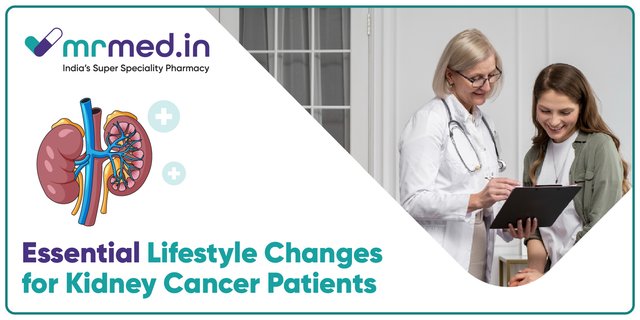Lifestyle and Diet Tips for People with Advanced Kidney Cancer
Living with kidney cancer can feel overwhelming, both physically and emotionally. While medical treatment plays the primary role in managing the disease, lifestyle and diet choices can make a big difference in how patients feel on a daily basis. Healthy routines, supportive eating habits, and positive coping strategies can improve strength, reduce side effects of treatment, and promote better overall well-being. With the right approach, patients can take an active role in their care and feel more in control of their health journey.
What Lifestyle Changes Help in Managing Advanced Kidney Cancer?
Lifestyle choices have a direct effect on energy levels, treatment outcomes, and quality of life. Doctors often recommend a combination of small but meaningful changes that can support patients throughout their journey.
Key strategies include:
- Staying physically active: Light activities such as walking, stretching, or yoga can improve circulation, reduce fatigue, and boost mood.
- Maintaining a healthy weight: Avoiding excess weight helps ease strain on the body and reduces treatment-related complications.
- Getting enough rest: Good sleep supports the immune system and helps the body recover from treatments.
- Avoiding smoking and alcohol: Both can interfere with the effectiveness of therapy and further harm the kidneys.
- Stress management techniques: Relaxation methods like meditation, breathing exercises, or gentle hobbies help reduce emotional stress.
By following these habits, patients can feel stronger and better prepared to handle treatment side effects.
What Foods Should Be Included in the Diet for Advanced Kidney Cancer?
Nutrition plays a major role in supporting kidney function and managing cancer-related fatigue. Since kidneys help filter waste, the diet needs to be carefully balanced to avoid overloading them.
Recommended foods include:
- Fresh fruits and vegetables provide vitamins, minerals, and antioxidants.
- Whole grains like brown rice, oats, and quinoa provide steady energy.
- Lean proteins, such as fish, chicken, or plant-based sources, can help maintain muscle strength.
- Healthy fats from nuts, seeds, and olive oil to support overall health.
- Hydration with water and herbal teas helps flush out toxins.
Patients are often advised to limit salt, processed foods, and high-phosphorus items to reduce strain on the kidneys. Consulting a dietitian is important, as dietary needs may change depending on the stage of kidney function and treatments being used.
What Foods Should Be Avoided in Advanced Kidney Cancer?
Some foods can worsen symptoms or add unnecessary stress on the kidneys. Patients are usually advised to cut back on:
- High-sodium foods like packaged snacks, canned soups, and fast foods can raise blood pressure.
- Red and processed meats, which can be harder to digest and increase kidney workload.
- High-phosphorus foods such as cola drinks, organ meats, and processed cheese.
- Sugary items like sweets and soft drinks may increase fatigue.
- Too much dairy can raise calcium and phosphorus levels in the blood.
By avoiding or limiting these, patients can manage their symptoms better and reduce the chances of treatment-related complications.
How Can Physical Activity Benefit Kidney Cancer Patients?
Exercise may seem challenging during cancer treatment, but gentle physical activity has proven benefits. It not only strengthens the body but also improves emotional well-being.
Benefits include:
- Increased energy levels and reduced fatigue.
- Better sleep quality and relaxation.
- Improved appetite and digestion.
- Enhanced circulation, which helps the body heal faster.
- Reduced risk of muscle loss during treatment.
Activities can be tailored to individual ability, such as walking, light stretching, swimming, or guided yoga. Doctors usually suggest starting slow and adjusting intensity based on comfort.
How to Cope with Emotional Stress During Advanced Kidney Cancer?
Living with advanced cancer brings emotional challenges that can affect both patients and their families. Stress, anxiety, and fear are common but can be managed with proper support.
Helpful coping strategies include:
- Counselling or therapy to process emotions and reduce anxiety.
- Support groups where patients can share experiences and learn from others.
- Mindfulness practices like meditation, journaling, or prayer can help calm the mind.
- Strong communication with loved ones to reduce feelings of isolation.
Managing emotional health is as important as physical care, as it directly influences recovery and quality of life.
What Role Do Medications Play Alongside Lifestyle and Diet?
While lifestyle and diet changes are important, they work best when combined with appropriate medical treatment. Doctors may prescribe targeted therapies or other medications depending on the stage of the disease.
For instance, EverGraf 0.5mg, which contains Everolimus, is sometimes used in advanced kidney cancer treatment. It works by slowing cancer cell growth and is usually part of a comprehensive care plan that includes medical monitoring, lifestyle support, and nutritional guidance.
This combination approach helps ensure better results and allows patients to manage both the disease and treatment side effects more effectively.
Why Is Professional Guidance Important for Lifestyle and Diet?
Every patient’s condition is unique, which means lifestyle and diet recommendations need to be personalised. Factors such as kidney function, treatment type, and overall health determine what works best.
Professional guidance ensures:
- Diet plans that balance nutrition without overloading the kidneys.
- Exercise routines tailored to energy levels and medical restrictions.
- Medication adjustments are based on how the body responds.
- Psychological support to help with emotional challenges.
By working closely with healthcare professionals, patients can achieve the best possible quality of life during advanced kidney cancer management.
Final Thoughts
Managing advanced kidney cancer is not only about medical treatment, it also involves making smart lifestyle and diet choices. By eating kidney-friendly foods, avoiding harmful items, staying active, and seeking emotional support, patients can improve their strength and reduce complications. With the right balance of professional guidance and personal care, individuals can better cope with challenges and maintain a higher quality of life.
